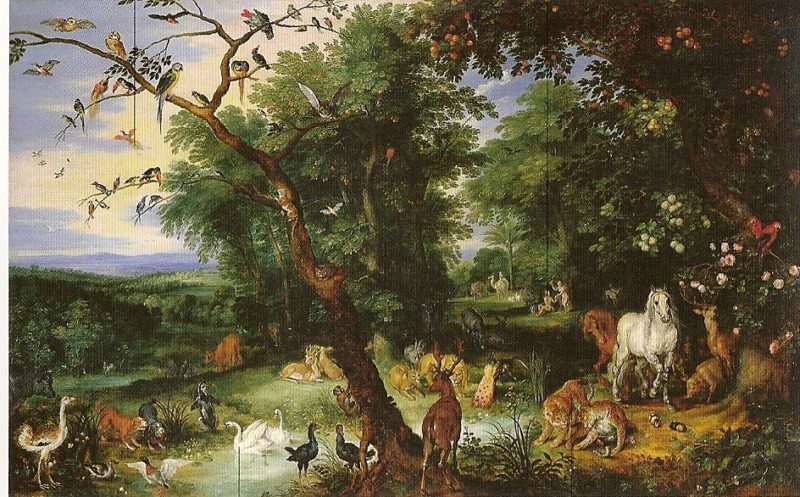Recently, a Christian brother published a “sympathetic critique” of Darrow’s book Discipling Nations. He raised issues about Disciple Nations Alliance teaching that have been noted by others from time to time. Because of that, and in the spirit of a free exchange of ideas, we offer here, in six parts, our brother’s critique and Darrow’s response. editor
Fifth, his interpretation of scripture is questionable. He says, for example:
- Our mandate includes bringing substantial healing to nature, standing against the decay, and causing deserts and gardens alike to bloom (163, 165).
- We transform the world…to discover the design behind nature (science) and to apply those laws (technology) to attack the ravages of natural evil, the “thorns and thistles” (228).
In both cases his proof text is Romans 8:19-22, which is an odd theological interpretation of the text in its context or within the broader biblical narrative:
For the creation waits in eager expectation for the children of God to be revealed. For the creation was subjected to frustration, not by its own choice, but by the will of the one who subjected it, in hope that the creation itself will be liberated from its bondage to decay and brought into the freedom and glory of the children of God. We know that the whole creation has been groaning as in the pains of childbirth right up to the present time.
~
Greetings, Richard. Let’s look at your fifth suggested weakness. You say that my “interpretation of scripture is questionable.”
My own commitment has been to the classic historical-grammatical approach rather than the higher critical method of the rationalistic moderns, or the imagining approach of postmoderns. My guess is we would be in agreement in our basic approach to hermeneutics. If not, this could be a reason to disagree with my interpretation of scripture.
Discipling Nations includes healing brokenness
Then you give two examples. The first relates to the nature of healing to take place in our broken world, and the second relates to my understanding of the concept of a nation.
In the context of the broader biblical narrative, I begin reading scripture from Genesis 1. This is critical because much of the biblical worldview is laid out in Genesis 1-3. Genesis 1-2 presents God’s intention for mankind and creation, how things were meant to be. Genesis 3 tells us what went wrong, how things got broken. In Genesis 1, God makes the judgment, after each step of creation, “it is good” or “it is so.” It is indeed as he conceived it. Everything God created was in harmony with God and with the rest of creation.
 Genesis 3 reveals that man rebelled against God and thus all his relationships were broken. There was sin, evil and brokenness throughout the creation. Man’s relationship with God was broken, his relationship with his fellow man was broken, his relationship with creation was broken, and his relationship with himself (he no longer knew his true identity as the image of God) was broken.
Genesis 3 reveals that man rebelled against God and thus all his relationships were broken. There was sin, evil and brokenness throughout the creation. Man’s relationship with God was broken, his relationship with his fellow man was broken, his relationship with creation was broken, and his relationship with himself (he no longer knew his true identity as the image of God) was broken.
Two types of Christians
There are two types of Christians. The first group can be called Genesis 1 Christians as they begin their study of scripture with Genesis 1, understanding the broader biblical context beginning with God’s good and perfect intentions for man and creation. Genesis 1 Christians understand the First Commission (or the Cultural Mandate) of the first two chapters of Genesis. They understand that man’s rebellion had consequences for all humans and all of creation. Christ, who is sovereign over all (Col. 1:18), died on the cross to reconcile all things to himself (Col. 1:20).
I hardly think that Romans 8:19-20 is a proof text. In the larger context of Genesis 1-3, God has a love for both mankind and for creation. His intention is that, in the end, there will be shalom, and this peace will restore everything broken in the fall.
Francis Schaeffer was fond of saying that there should be “substantial healing” for man and all his relationships. This simple phrase stands against two trends in Christendom. The first trend is the belief that man’s relationship with God is the only thing healed by Calvary. The second is the expectation that man has the ability to reconcile all things by his own effort. Both of these are false. The truth, on the other hand, is that, in Christ, we should expect and work towards substantial healing in all our relationships, including our relationship with the rest of creation.
The second type of Christian I refer to as Genesis 3 Christians. They begin their reading of scripture with the fall and the impact of the fall, typically limited to man’s broken relationship with God, and his fallen nature. When we begin in Genesis 3, we limit the cross and the work of redemption to the salvation of souls to go to heaven. Christ died on the cross for my sins so that I could be reconciled to God in time and in eternity. This, of course, is true! But Genesis 3 Christians begin with a narrow biblical context, starting with the fall and our brokenness rather than the broader biblical context beginning in Genesis 1.
 The “Godfather of English Hymnody,” Isaac Watts, certainly understood the comprehensiveness of salvation. In his wonderful Christmas hymn, “Joy to the World,” the third stanza records these remarkable words:
The “Godfather of English Hymnody,” Isaac Watts, certainly understood the comprehensiveness of salvation. In his wonderful Christmas hymn, “Joy to the World,” the third stanza records these remarkable words:
No more let sins and sorrows grow
Nor thorns infest the ground.
He comes to make His blessings flow
Far as the curse is found.
What is a nation?
You then mention that “a more serious error is Miller’s use of the term, ‘nations.’”
Perhaps you have misread me. I fully understand both the blessing on Abraham to be a blessing to the nations (Hebrew miš·pā·ḥā(h): families, clans, tribes, peoples), and the commission given by Jesus to disciple panta ta ethnē: a race, people group or a nation. I find the Greek word ethnē fascinating as it is part of a family of words that include:
– ethos: distinguishing moral nature
– ethical: actions deserving moral approval
– ethics: governing principle of conduct; governing moral or social order.
 So, in a sense, the word ethnē entails a defining moral order, the distinguishing moral/behavior code. I think back to something we talked about earlier, that culture is derived from cult. Theologian and pastor Dr. George Grant writes of Augustine:
So, in a sense, the word ethnē entails a defining moral order, the distinguishing moral/behavior code. I think back to something we talked about earlier, that culture is derived from cult. Theologian and pastor Dr. George Grant writes of Augustine:
According to Augustine, culture is not a reflection of a people’s race, ethnicity, folklore, politics, language or heritage. Rather it is an outworking of a people’s creed. In other words, culture is the temporal manifestation of a people’s faith. If a culture begins to change, it is not because of fads, fashions, or the passing of time; it is because of a shift in the worldview – it is because of a change of faith.
All this to say that I understand the difference between the meaning of the word nation as used in scripture and the modern political-social-economic entity. Most modern states have many ethnē. However, whether we think of nations in the biblical frame of ethnē or in terms of the modern nation-states, the good news of Jesus Christ is to be brought to them.
What is the Great Commission?
But you raise another issue here as well, that is, the nature of the great commission. I would argue that the gospel is dynamic; it is to travel both horizontally and vertically. Jesus says in Acts 1:8 that we are to be his witnesses to the end of the earth to every tribe and language and people and nation. It is to go to every ethnē. This is the horizontal aspect of the Great Commission.
Then it is to travel vertically; it is to penetrate culture. This is the commission as given in Matthew 28:18-20, to “disciple nations … teaching them to obey all that I have commanded.” It does not say merely to disciple individuals in every nation, but to disciple all ethnē – people groups. This includes and begins with the discipling of individuals but it does not end there. (See a graphical depiction, Our Approach: Transform the Nation Through the Church, at the DNA website.)
The Apostle Paul makes this clear in Romans 16:25-27:
Now to him who is able to establish you by my gospel and the proclamation of Jesus Christ, according to the revelation of the mystery hidden for long ages past, but now revealed and made known through the prophetic writings by the command of the eternal God, so that all nations might believe and obey him— to the only wise God be glory forever through Jesus Christ! Amen.
What is the end of the proclamation of the gospel? That nations might believe and obey! Paul speaks about panta ta ethne believing and obeying. For a nation to believe and obey, there needs to be a critical mass of people who have come to Christ and who have been discipled, as we have discussed earlier, at the level of culture.
 Order is the first need of any nation. The Kingdom ethos lays a foundation for building free, just and compassionate societies, which glorify God in their obedience and allow the glory of the nation to be revealed.
Order is the first need of any nation. The Kingdom ethos lays a foundation for building free, just and compassionate societies, which glorify God in their obedience and allow the glory of the nation to be revealed.
Matthew Henry’s comments on Matthew 28:19 shed further light on this question.
“[D]o your utmost to make the nations Christian nations;’’ not, “Go to the nations, and denounce the judgments of God against them, as Jonah against Nineveh, and as the other Old-Testament prophets,”… “but go, and disciple them.” Christ the Mediator is setting up a kingdom in the world, bring the nations to be his subjects; setting up a school, bring the nations to be his scholars; raising an army for the carrying on of the war against the powers of darkness, enlist the nations of the earth under his banner.”
Christians and nations are to know and do. Jesus says that part of discipleship is to teach nations all that Jesus has commanded.
Since the Enlightenment and the reaction to the advance of secularism, evangelicalism has become more individualistic. We don’t like to think about social implications – of communities and cultures–as much. We are uncomfortable with this. But the Bible presents the radical impact of the gospel on both the individual and communities/culture.
As I noted earlier from Ralph Winter, First Inheritance Christians understand that the Great Commission is comprehensive and wholistic, to make disciples of all nations: “thy kingdom come, thy will be done on earth as it is in heaven.” Second Inheritance Christians tend to reduce the Great Commission to the Greek Commission of saving souls for heaven.
Richard, I agree with you on the scriptural meaning of nations, but would argue that the Great Commission is indeed the GREAT commission. For more on this subject, I unpack the Great Commission in my book: Emancipating the World: A Christian Response to Radical Islam and Fundamentalist Atheism.
- Darrow Miller






